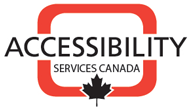Talks
Disclaimer: While we have provided links to individual speakers slides after their talk descriptions, the content of each speaker's slide deck belongs to them, and not all speakers have shared their slides.
The Quest for Peace as a Disabled Games Accessibility Specialist
Four years doesn’t sound like a long time but it sure feels like it when your quest list is ever evolving and the paths are rarely peaceful. Cherry will be sharing their road to UX and Systems Design in games, born from a brush with death and a stubbornness to endure pain.
Games are a unique medium with heavy interaction, incredible cultural significance, and a huge impact on disabled players for everything from quality of life to pain management. Accessibility has come on leaps and bounds but it’s still at a point where it’s seen as an add-on or ‘special’ rather than a core design principle.
Being the specialist is about being The Noisy Thorn. What do you do when you always have to start from square one; breaking down social stigmas before you can get started on the fun technical stuff? How do you deal with the pressures of teaching so many about disability culture? What if the industry isn’t accessible to you? How do you tackle marginalization while also experiencing it?
Cherry can’t promise to have the answers, is an existentialist, and often feels like they’re drowning, but they are also uncharacteristically optimistic and has big hopes for the future of games as the industry matures.
Cherry Thompson

Cherry Thompson is a games accessibility specialist/developer with a keen focus in systems design and user experience. They’ve worked on projects of various sizes from small indies like Gambrinous (Cardpocalypse), GlitchMN (HyperDot) to AAA such as Guerrilla Games (Horizon Zero Dawn), Media Molecule (Dreams), Crystal Dynamics (Marvel’s Avengers), Ubisoft and more.
Cherry is also autistic, so to their complete surprise, they’ve been a successful public speaker at conferences like GDC, Full Indie, PAX, and internal to many studios. This was all thanks to a gentle push from their favourite Games Accessibility Conf. They have a passion for making both games and the industry inclusive of everyone. Their hobbies consist of cake eating, bird watching and adventuring with their one eyed cat, Odin.
Value
We've told ourselves and each other for years that we should be happy with small victories -- we worked with our teams to make the world a little more accessible. And yes, knowing that we made a difference is both motivating and professionally satisfying. But what happens when that isn't enough? How can we measure our work? How do we know we are getting better at practicing our craft? The answer lies in how we actually do the work, because how we do the work actually matters.
Derek Featherstone
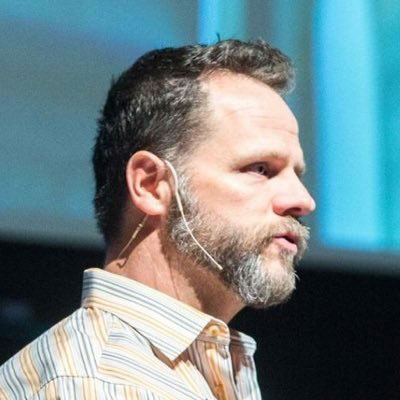
Derek Featherstone is an internationally known speaker, practitioner, and authority on accessibility and inclusive design. He has been working on the web since 1999, when he left his career as a high school teacher to start his own web design company.
Derek is the Chief eXperience Officer at Level Access – focused on ensuring that accessibility and inclusion are an integral part of creating outstanding customer experiences. He teaches teams accessibility concepts and skills, and leads hands-on workshops with teams of all sizes. Working with Derek will help you analyze and improve your process, and incorporate accessibility and inclusive design processes into your UX and service design practice, and development methodologies.
Garbage Pail Components
Oh, the horror! Hot garbage has taken over the web. Carousel Carol, Type-Ahead Tommy, Shallow Dom, Trappin' Tam...the gang's all here. We'll turn the "bad accessibility" dial up to 11 in order to feel the pain that users with disabilities experience on a regular basis. Some of the patterns in this talk will be directly inspired from real life instances–because we can't even make this stuff up. By facing our miserable fears and burning everything to the ground, we'll be reborn and better equipped to create truly successful user interfaces.
Marcy Sutton
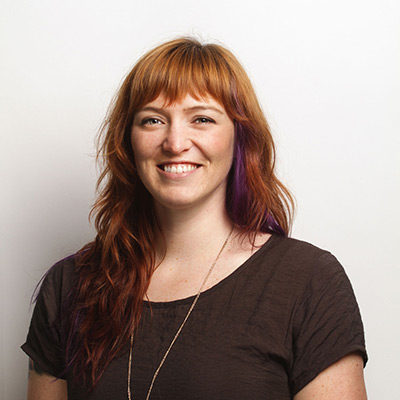
Marcy Sutton is the Head of Learning at Gatsby, a startup creating fast, accessible websites and web-apps while building a strong community. Previously, she was a Developer Advocate and Senior Frontend Engineer on the axe-core team at Deque Systems, developing tools for web accessibility testing. In 2016, O’Reilly gave Marcy a Web Platform Award for her work in accessibility. She co-leads the Accessibility Seattle meetup and recently founded a group called NW Tech Women. When away from the keyboard, Marcy can be found hiking with her dog, riding a bicycle, or snowboarding.
HTML is accessible by default, right?
Well, mostly... but not always, and maybe not in the way you might think?
This talk will look at the semantics of a few HTML elements and attributes where, going by the specification alone, you may not necessarily get the accessible user interface you were hoping for. And in such cases, what should you do to compensate, if anything?
Scott O'Hara

Scott joined The Paciello Group in 2017, bringing with him nearly two decades of experience working as a designer and front-developer for product companies, and UX consulting and design agencies. When not working, he can often be found testing and writing about the support for various markup patterns and ARIA attributes. Scott needs a hobby.
Systems of Systems
Design systems create an umbrella to to define the future of our design work. But design systems are not the biggest umbrella, so to speak—they exist under broader social, political, and infrastructural systems that affect the parameters, limitations, and variables of our system. Investigating design systems across many verticals, we'll look to see how design systems are impacted by the systems they live within. And beyond the verticals, we'll look to see how broader systems of power and oppression influence the design systems, and ultimately, the users who use the products defined by them. We'll look to see how to assess where our design systems live in broader ecosystems, the challenges inherent, and how to lean into the good, and resist the bad, to ensure we're serving all humans in an equitable and ethical way, maintaining safety and trust.
Tatiana Mac

Tatiana Mac is an independent American designer who works directly with organisations to build clear and coherent products and design systems.
Cognitive Accessibility 101
I love questions. Each question is a chance to investigate the world through a new lens. This is a talk about my autistic lens. The way I approach the world and some of the barriers I encounter. We will explore a model for cognitive access and then discuss some of the interesting questions it leads too.
Jamie Knight
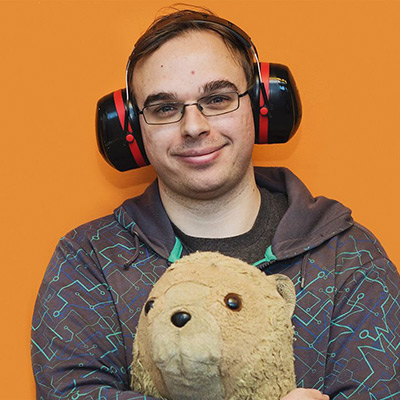
Jamie and Lion are an autistic duo who live in Romford. They are not very good at writing third party bios and are a bit shy. If asked they would tell you about their work. Almost 10 years at the BBC working on everything from iPlayer Radio to children’s gaming.
The Inevitability of Accessibility
Using Elizabeth Kubler-Ross's 5 stages of grief as a framework, this talk will explore the challenges organizations experience as they grapple with what it takes to build accessible products.
How organizations, and we as accessibility professionals, recognize and cycle through these stages deeply impacts our resiliency.
Natalie will offer resources, tips, and tricks for navigating the stages on the quest for a web that works for everyone.
Natalie Patrice Tucker
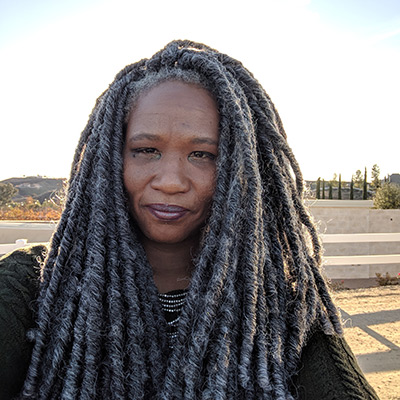
Natalie Patrice Tucker has nearly two decades of experience building the accessible web. Committed to a web that works for everyone, she spends her days (and far too many nights and weekends) serving as a subject matter expert in the area of web accessibility and training an army of developers and stakeholders to carry the charge.
Speech Recognition Solutions
I have been a Dragon NaturallySpeaking user for over 20 years. In this talk, I will explain the three methods I use for interacting with web content: direct access, indirect access, and keyboard emulation. I will provide examples of techniques that designers and developers can use to support Dragon NaturallySpeaking users that lead to better experiences for everyone.
Eric Wright

Eric is a Sr. Lead Technologist at Booz Allen Hamilton, with over ten years' experience training developers, designers and project managers throughout the United States federal government to buy, build, manage and maintain accessible technology. He is a co-founder of the Northeast Disabled Athletic Association, a Vermont-based nonprofit that provides opportunities and equipment to athletes with physical disabilities to play recreational and competitive sports.
Designing Accessibility Education In Organizations
We all know educating our organizations about accessibility is crucial to make a culture of inclusion thrive. In this talk we’ll discuss ways to create learning opportunities around accessibility for designers, content strategies, developers, support staff, product management, and leadership. We’ll take into account that people have different learning needs and styles, and that accessibility education is a long process.
Devon Persing
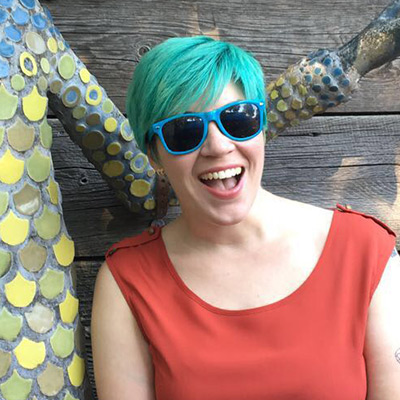
Devon Persing is an accessibility specialist at Shopify, and has been working in digital accessibility since 2012. Her current focus is on documentation and support for Shopify’s design system, Polaris, as well as remote and in-person education for people in development, design, content, and related roles. Prior to joining Shopify in 2018, she was a member of the team at Simply Accessible.
fAuLT TEXT: The Modern Challenge Of Working With ALT TEXT
"Billions of pictures are uploaded daily to sites and social networks. They are the life and blood of the web, and are the most prevalent resources on a page. However, in a study on accessibility, 70% of sites had missing or inaccurate alternative text. This all too important detail has sadly been left off the required checklist, degrading the user experience for many. In light, solutions around automation of this task have come into play, with much of it revolving around artificial intelligence, machine learning and computer vision. In fact, Google is currently running a Chrome experiment in where users can opt in to automated image description. However, that has also come with its own challenges.
fAuLT TEXT: The Modern Challenge Of Working With ALT TEXT is a talk about alternative text, the importance of providing this information, the hurdles that have come in its processing, and though rooted in a good place - how automation isn't a true answer.
Henri Helvetica
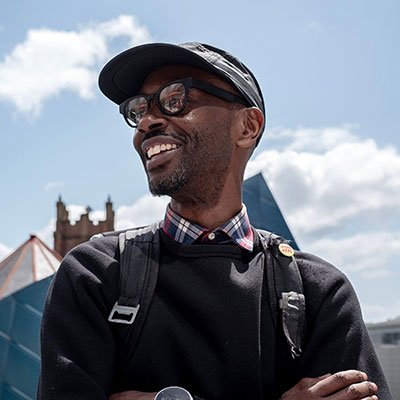
Henri is a freelance developer who has turned his interests to a passionate mix of site performance engineering and pinches of user experience. When not reading the deluge of daily research docs and case studies, or indiscriminately auditing sites in devtools, Henri can be found contributing back to the community: Toronto Web Performance Group meetup + SPOTLIGHT: PERFORMANCE conference co-organizer, curating performance content for conferences or volunteering his time for lunch and learns at various bootcamps. Additionally, you can find him speaking at conferences, and touching base w/ the community - all with a radiant smile. Otherwise, he’s focusing on running the fastest 5k possible (surprise surprise).
Dimensions: Community Tools for Nonvisual Access to Spatial Information
In a small graphics lab at the New York Public Library, Blind people and our allies are drawing and creating 3d objects with code, experimenting with a range of tactile drawing and printing processes, and creating tactile circuit diagrams, maps, graphs and more. Join us in exploring the world of nonvisual computer-aided design.
Chancey Fleet
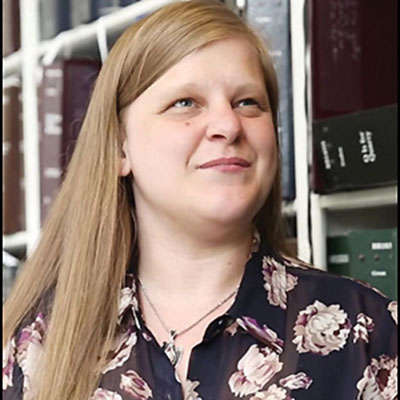
Chancey Fleet is a Brooklyn-based accessibility advocate. Fleet coordinates technology education programs at the New York Public Library's Andrew Heiskell Braille and Talking Book Library. Her current library-based projects include group workshops highlighting mobile technologies for independent living and information literacy; programs introducing youth and adults to non-visual techniques for coding and making with Arduino; and the Dimensions project (a recipient of NYPL’s 2016 Innovation Grant for staff projects), which equips community members with the training and tools they need to create accessible tactile maps, diagrams, graphics and objects. Chancey was recognized as a 2017 Library Journal Mover and Shaker. In her Data & Society fellowship work in 2018-2019, Chancey hopes to deepen public understanding and spark widespread curiosity about how cloud-connected accessibility tools enhance or undermine digital equity, autonomy, security, and privacy.
These Aren't The SCs You're Looking For...
WCAG is supposed to give us a reasonably objective way of saying whether or not the sites we are building/auditing are "accessible" (to a particular baseline). However, they are only as useful as our understanding and interpretation of the actual guidelines' normative text. And of course they're not perfect - with some omissions, handwaving, and straight up loopholes. So where does this leave developers and auditors? In this talk, Patrick may not have all the answers, but he'll have a good rant around the subject anyway...
Patrick Lauke
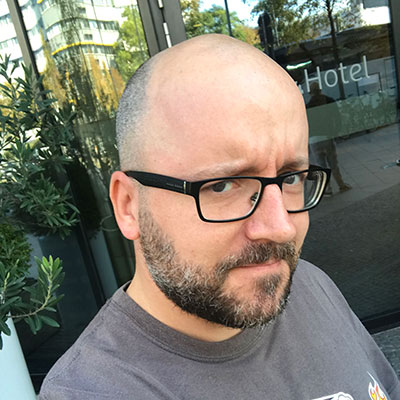
Patrick H. Lauke works as Principal Accessibility Engineer for The Paciello Group. In a previous life he was a Web Evangelist in the Developer Relations team at Opera. He's been involved in the discourse around Web Standards and Accessibility since 2001, actively speaking at conferences and participating in early initiatives such as the Web Standards Project (WaSP). Nowadays, he acts as a WCAG trash panda, contributing to the specification in the hopes of making the standard both robust and pragmatic. His personal corner of the web can be found at www.splintered.co.uk.
JavaScript and Accessibility: An Unconventional Romance
JavaScript and Accessibility are frequently seen as juxtaposed. However, JavaScript is necessary to make interactive features accessible until browser support catches up. When used effectively, you can use JavaScript to make your interactive web apps more accessible to your users!
Lindsey Kopacz
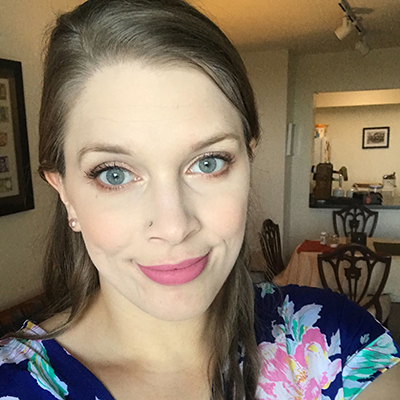
Front End Developer and professional learner with accessibility expertise. Lindsey is passionate about breaking down concepts into understandable and relatable concepts, making it more approachable. In her free time, you can catch her making muscle gainz, reading, or drinking craft beer.
Being Human Together: the limits of accessible VR
Based on a 2019 UK research project, this talk is about how work on accessible virtual reality explored and uncovered deeper issues about being human. How the desire for human company and to tells stories together affected the prototyping and design of a museum exhibit.
Alastair Somerville

Alastair Somerville is a sensory design consultant. He provides expert advice on cognition and person-centered design to companies and public organisations who provide both physical and digital products or services. He facilitates workshops on sensory and emotional design for corporations and major conferences, including SouthBy Southwest (SxSW) and UX Week. He is currently involved in cognitive accessibility and VR projects in visitor attractions and museums.
Adding Task-Oriented Walkthroughs To Your Toolkit
Ever tabbed through a website and been surprised or frustrated at how many tabs it takes to do common tasks like getting to your trolley to complete a purchase? What you are doing is undertaking a task-oriented walkthrough. In this presentation, we will guide you through the steps to conduct task-oriented walkthroughs by adopting personas with different access needs and trying to complete key tasks as if you were the user. We’ll show you how this technique is equally useful at the design stage to help avoid potential issues before usability testing is possible, as well as to understand the experience in existing products.
Sarah Pulis
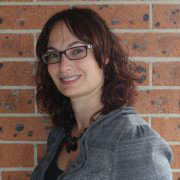
Sarah is Director and co-Founder of Intopia with 9 years of digital accessibility. Sarah founded Intopia 3.5 years ago after working with PwC Australia and Media Access Australia. She is also founder of A11y Bytes and A11Y Camp, which have grown to be Australia's largest events on digital accessibility and inclusion.
Andrew Arch
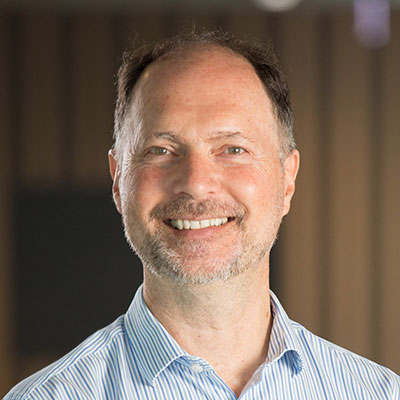
Andrew is a Principal Consultant with Intopia and has been working in the field of digital accessibility for over 20 years. During this time, he established the digital access team at Vision Australia, worked on ageing and disability at the W3C in Europe and as the senior accessibility and inclusion expert in the Australian Government.
Civil Rights or Shakedowns: Ethics of the Digital Accessibility Legal Space
The United States has seen an avalanche of web access lawsuits in the past three years. What can Canada learn from the US legal landscape as it begins to implement the Accessible Canada Act? Some lawsuits advance accessibility, while others turn accessibility's potential for innovation into a narrow compliance issue or worse. Non-lawyers in the accessibility space can put the law in their pocket to motivate teams and gain executive buy-in. Distinguishing between shakedown lawsuits and legal actions that protect the civil rights of disabled people is key.
Lainey Feingold
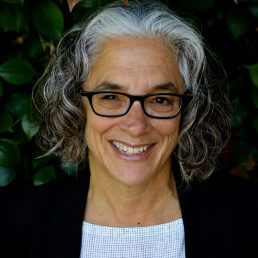
I'm a disability rights lawyer who has worked in the accessibility space since the mid-1990s. I have worked with blind people and their organizations to advance digital accessibility with some of the largest companies in the United States. My book about this work is called Structured Negotiation, A Winning Alternative to Lawsuits. It tells the story of how blind people and their lawyers have used civil rights laws and collaboration to advance accessibility through relationship building and problem-solving instead of with conflict and expense. I do a lot of speaking and training about digital accessibility and about how the law can help advance the civil rights of people with disabilities to participate in the digital world. More on my website, including articles, media, and awards.
Accessibility Is A Hydra
When Hercules fought the hydra, its heads would grow back no matter how many times he cut them off. Web accessibility professionals put repeated effort toward fighting accessibility barriers, and often feel like their work is never done. If we want to prevail against accessibility barriers, we have to understand our own hydra: we have to talk about ableism.
EJ Mason
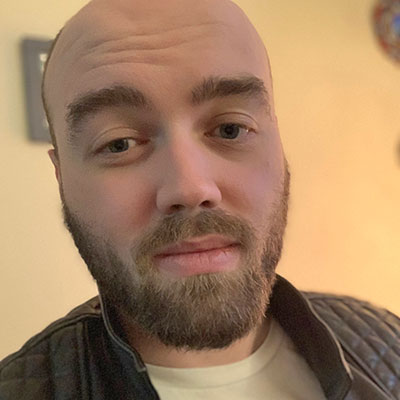
EJ Mason is a web developer, accessibility specialist, and disability rights advocate. They bring their experience advocating for a more inclusive physical world into a passion for creating a better web. When they’re not writing JavaScript or teaching others to code, you’ll probably find them writing screeds about the art of storytelling or reclaiming contraband objects from a golden retriever named Thor.
Accessibility for Content Creators
Learn some basic techniques to help content creators make sure their content pieces and updates are accessible.
Caitlin Cashin
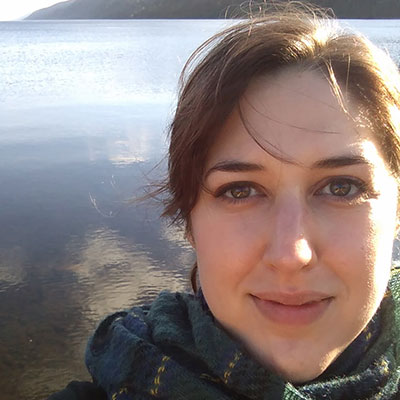
Caitlin currently works as a Marketing Manager at Gatsby. Prior to this, she spent 8 years working at Deque Systems in a variety of marketing roles. At any given time, her responsibilities included content creation, SEO, product marketing, brand development, and more.
Unconventional Tech for Users with Divergent Abilities
Some users with neurological injury, diseases and disorders are either unable to use commercial AT out-of-the-box, or procure a system that works well for them.
This session aims to highlight their needs through a series of real world cases, along with a look at the highly customized UIs and hardware responsible for giving them a voice, including eye and face tracking, EEG and a few switches.
Javed Gangjee

Javed Gangjee is the Tech Lead at SpeakYourMind Foundation, a non-profit dedicated to creating, distributing, and supporting customized assistive technologies for individuals who are unable to effectively communicate due to neurological injury and disease.
Beyond Accessibility: Learning from the disabled community
Design is power. We can learn how the disabled community has battled barriers caused by designers in power in the past. The disability community are often study participants, testers, and developers for digital accessibility. It can be overwhelming to engage the disabled community, and this talk will give practical advice to engage the disabled community. We all want a more inclusive digital world.
Liz Davis
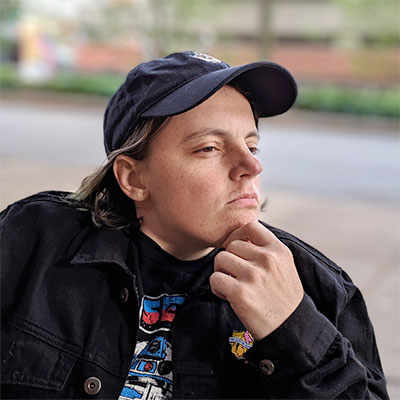
Liz Davis is a UX designer and disability advocate in Chicago. She is in the process of earning an MS in Human Computer Interaction from DePaul University.
Her life with a disability, and using a wheelchair offers a unique perspective on design. Her passion is bringing the disabled community and tech community together to create better designed products. When not shouting about much she hates stairs, she's taking her dog Hagrid to the park to chase squirrels.
Accessibility & Procurement - Where it All Goes Wrong!
Adding "Must be WCAG 2.0 AA compliant" into RFPs doesn't produce accessible sites, so what does? How can we make sure that the procurement process helps select for those vendors who can build sites that follow best practices? What can you do to ensure that your next RFP produces better results than the last one?
Mike Gifford
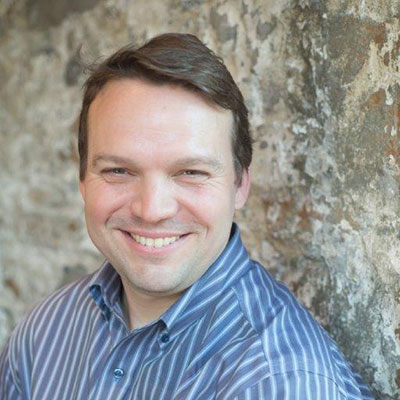
One of Mike Gifford’s goals, through his company OpenConcept Consulting Inc., is to fix the accessibility problems at the source using the Drupal open source content management system. By taking this approach over a million web sites are enabled to become more accessible. Mike is a Drupal Core Accessibility Maintainer and has been spearheading improvements in the Drupal community since 2009. Mike founded A11yYOW back in 2011 and has been active in the accessibility unconference/camp movement since then. Beyond working with Drupal, Mike is increasingly looking at the systems which perpetuate barriers in our society. Mike is an advocate of bringing accessibility into open source projects so that everyone can benefit.
Screen Readers and CSS: Going Out of Style (and Into Content)
Through live demonstrations, participants will learn how various CSS declarations affect content exposure and reading order in several popular screen reader/browser pairings.
This includes popular screen readers such as JAWS, NVDA and VoiceOver combined with the latest versions of Firefox, Chrome, Safari, and IE11. Mobile findings will be included as well.
CB Averitt
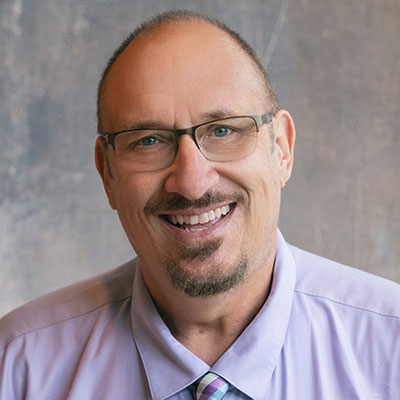
CB Averitt is a Principal Consultant with Deque Systems. CB has been in web development for over 18 years. Having owned and operated Averitt Web Services, he has experience with front-end and back-end development as well as design and user experience. CB is certified by the IAAP as a Web Accessibility Specialist (WAS).
In 2005, CB was introduced to accessibility from working in the education sector. CB was heavily involved with making SC colleges Section 508 compliant. Since that time CB shares his expertise and passion for the open web with government, education and companies that range from small business to Fortune 50. CB has extensive knowledge in WCAG, AODA, and Section 508 regulations.
CB has completed hundreds of assessments and remediations in numerous technologies such as web, PDF and mobile. He has performed numerous presentations across the State of South Carolina. He has presented at major accessibility conferences such as CSUN’s “Annual International Technology and Persons with Disabilities Conference” as well as Knowbility’s “John Slatin AccessU”. CB has been a volunteer with The South Carolina Assistive Technology Advisory Committee (SC ATAC) for over 10 years.
A Sustainability Based Approach To Accessibility - Why we need to treat exclusion like pollution
In this short talk Neil will draw parallels between sustainability and accessibility looking at the macroeconomic issues of climate change, age and disability.
When we look at exclusion through a sustainability lens it helps address the challenges of accessibility at a social level and gives us opportunities to refocus and innovate.
Neil Milliken

Neil Milliken is Global Head of Accessibility at Atos, an invited expert for the W3C Cognitive Accessibility Taskforce , member of the Atos Scientific Community & Atos Distinguished Expert. He is co-founder of AXSChat Europe’s largest twitter chat with a focus on Accessibility & Inclusion. Neil is a member of the Board of Directors for WID & Chair of the Diversity Board for Institute of Coding. Neil was named in the top ten of the Shaw Trust Disability Power 100 list in 2018.













